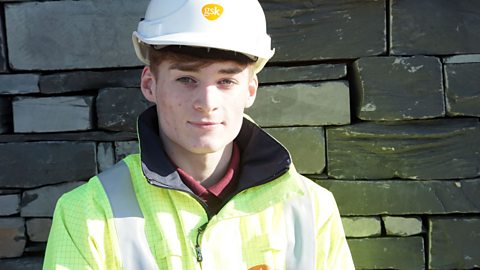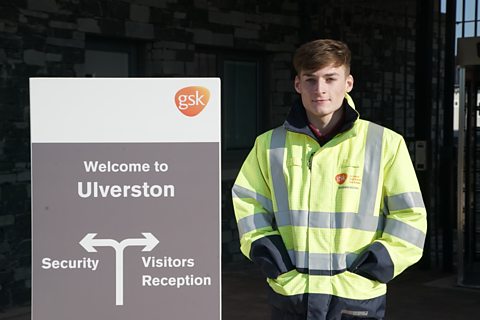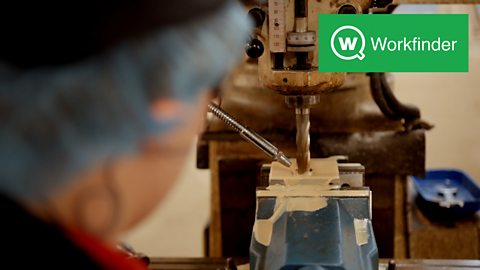Meet Ben: he's 18 and grew up in Cumbria. Find out about his job as a trainee electrical engineer at GlaxoSmithKline (GSK). Part of our Bitesize world of work series.

Never, ever give up!
How would you describe your job?
I am an Electrical Instrumentation Apprentice at GSK Ulverston. My job involves designing, maintaining and improving manufacturing facilities that are used in the pharmaceutical industry.

What does your apprenticeship involve?
In the first year I was in college full time studying for my Level 3 NVQ Extended Diploma in Engineering Maintenance.
In my second year I was on a rotation plan where I worked four days per week on site and had one day off to study for my Level 3 Diploma in Operations and Maintenance Engineering.
I'm in my third year now and am on a full-time rotation plan at GSK, with 12 week-long blocks off to study for a Higher National Certificate in Electronic and Electrical Engineering.
In my fourth year I'll finish the rotation plan and choose a specialism, at the end of which I will take my National Examination Board in Occupational Safety and Health Course.

How did you get into your job?
I've always been interested in understanding the mechanical workings of a product. My grandad used to work at GSK Ulverston too, so my interest in the pharmaceutical industry came from discussions with him.

What was your educational career path?
I knew I wanted to be an electrical engineer so I researched which qualifications I needed to get on to a GSK apprenticeship and chose Mathematics, Physics and Resistant Materials at GCSE. I also did a work experience week at GSK Ulverston in Year 10.
During my GCSEs I applied for an apprenticeship at GSK Ulverston. This involved a short online form, an online assessment and then a full application form in which I needed to demonstrate my skills. I then had an assessment day, a formal interview and, finally, was accepted onto the course. I started my apprenticeship after my GCSEs.

What skills do you use in your work?
I use mathematical and statistical skills in my job. I also use the scientific methods I learnt in Physics, particularly when doing calculations or dealing with electrics.
I also use lot of soft skills too, such as leadership, teamwork, communication and problem-solving – I've greatly improved in these areas since starting my apprenticeship. A good work ethic is also really important because you need to complete college assignments as well as attend work every day. Because I work on rotation, I also need adaptability and flexibility as I've worked with lots of different teams and in different departments.
I use technical skills as well, such as how to use hand tools properly and safely.

Top tips
Research what options are available to you. You can gain lots of qualifications through apprenticeships, as well as learn on the job and get paid. You need to find out what's best for you
It's good to have a back-up option. I also applied for sixth form, as well as for my apprenticeship, just in case I didn't get through
If you can, do a work placement. My work experience really helped me to get on to my apprenticeship.

What to expect if you want to be an engineer
- How many people work in the engineering sector?
- What can you earn in different roles?
- What routes can you take to get in?
- Is the demand for engineers expected to grow in the future?
Watch the film to find out the answers to these questions, and much more!
Other resources
- See what type of engineering role might suit you with the meet the future you quiz
- Find out more about the different areas of engineering with this guide from Tomorrow's Engineers
- Learn more about roles in engineering with the National Careers Service explore careers tool
- Discover a practical new way to study via T-levels (England-only).
Emma-Louise Have you ever had an idea for an invention, something you thought would make your life easier? If so, you've taken your first steps into engineering something.
Frankie As an engineer, you apply scientific principles to design and help create all sorts of things like buildings, aircrafts, or bras.
Emma-Louise Traditionally, engineering falls in four main categories: chemical, civil, electrical, and mechanical engineering. And, within each of these, there are more specific types of engineering disciplines.
Frankie There were nearly 870,000 engineers in the UK [in 2020], with an estimated 4% growth of just under 40,000 more jobs by 2025.
Emma-Louise You could consider roles such as electrical engineer, chemical engineer, mechanical engineer, nuclear engineer, or software engineer. For electrical engineers,
Frankie people who design, build and maintain electrical systems and equipment,
Emma-Louise there is an expected job growth of just under 1,600 jobs by 2025. As of 2020, the median salary was just over £50,000 per year.
Frankie For civil engineers,
Emma-Louise people who design and manage construction projects, anything from bridges to sports stadiums,
Frankie there's an expected growth of approximately 2,800 jobs by 2025, with a median salary of around £44,500.
Emma-Louise And for mechanical engineers,
Frankie people who develop and design machines that are used in various industries from construction to farming,
Emma-Louise there's an expected growth of just under 2,600 jobs by 2025, with a salary of around £42,000. If you've got a curious mind and love problem solving, engineering could be a good career path for you.
Frankie There are many ways into engineering. The first thing to figure out might be what kind of engineering you're interested in.
Emma-Louise You could consider apprenticeships that are relevant to that role, like a Level 6 Manufacturing Engineer or a Level 6 Electro-mechanical Engineer apprenticeship. These typically take between four and six years to complete.
Frankie Of course, there are also many university courses you could look into. Courses such as Electro-mechanical Engineering, Applied Physics, or Aeronautical Engineering. You would usually need two or three A-levels or equivalent for these, and some of these courses will specify if you need particular A-levels, or the equivalent. Maths and Science subjects are sometimes required.
Emma-Louise There's now more choice as the new T-level qualification is available in England. These two-year courses are equivalent to three A-levels and involve 80% classroom learning and 20% industry placement.
Frankie You can also find out about courses accredited by professional engineering institutions from the Engineering Council.
Emma-Louise Engineers have valuable transferable skills that are handy for other job roles and everyday life, such as problem solving, critical thinking, and working through potential solutions.
Frankie If you've heard things in the past that have made you think engineering is not for you, it might be worth taking a deeper look. Engineers are working on some of the most exciting challenges we face, be it enhancing virtual reality or engineering better medicines. Let's hear from some professionals. Ben is an aerospace engineer. "I love interacting and working with people to find solutions to problems. I enjoy knowing that millions of people fly around the world every year on products that I have helped develop. There's a big push at the moment for more environmentally friendly solutions. Air travel is a massive contributor to global warming and so anything that the industry can do to reduce harmful gases being emitted will make a big impact."
Emma-LouiseDavid, an expert at the Institution of Engineering and Technology, says: "The most exciting thing about engineering and technology is that there will be roles in the next five to 10 years that don't exist yet. Artificial intelligence (AI), coding and ‘green jobs’ – those that work to combat climate change – will continue to evolve and be some of the most important roles within the sector in years to come. It's also really important that the engineering industry is inclusive and representative as engineers, design products and services for everyone."
Emma-Louise Engineering is creative, exciting and not to mention that it pays pretty well once you've worked your way up beyond junior roles. The median wage within the sector is over £41,000, compared to the median full-time salary in the UK which is around £28,500.
Frankie There's also particularly strong growth in software publishing and wireless communications.
Emma-Louise Engineering is also an industry where the gender mix isn't well balanced, although the research is unclear as to why.
Frankie The main shortfall here is engineers who identify as female. As of 2020, 88% of engineers identified as male. However, lots of employers are keen to change this, so there should be more and more opportunities coming up for engineers who identify as female.
Emma-Louise One thing that's for sure is that there are going to be lots of opportunities available in the engineering sector, with just under 40,000 new jobs expected by 2025. So, if this has piqued your interest, then it'll be worth doing some more research to see if this is right for you.
For careers advice in all parts of the UK visit: National Careers Service (England), nidirect (Northern Ireland), My World of Work (Scotland) and Careers Wales (Wales).


Work experience in your area
Find work experience placements with Workfinder.
Tips and advice
Help with interviews, writing a CV and all things work experience related.


How to become an engineer. collection
Find out more about the engineering sector and how those currently working in it got their foot in the door.

Zoe: apprentice site engineer. video
Zoe's helping to build a London tube station.

Aine: junior simulation engineer
Aine works to make buildings more energy efficient.
